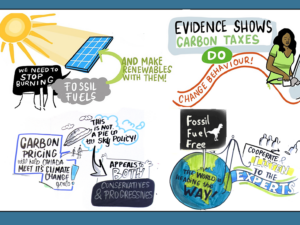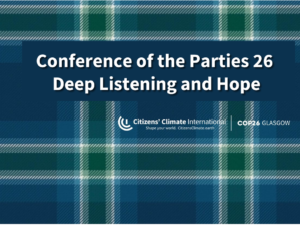
Progress in Durban on climate, but we mustn’t wait to act
Sudbury ON, DEC. 15, 2011– While it is encouraging that a path forward now exists for an international agreement on climate change, the deal completed Sunday in Durban, South Africa, will allow greenhouse gas emissions to continue rising until 2020, at which point we may well exceed the tipping point on global warming, Citizens Climate Lobby said Monday.
Under the agreement reached at the U.N. Framework Convention on Climate Change, phase one of the Kyoto Protocol will be extended until 2017. A legally-binding pact to limit greenhouse gases will be completed by 2015 and go into effect by 2020. The new agreement will include China and India, two of the world’s biggest greenhouse gas emitters that were not previously covered in the Kyoto Protocol. The U.S., which never ratified Kyoto, will also be part of the new agreement. However, Canada has pulled out of the Kyoto Protocol as of Monday, December 12, 2011 but still committed money to a $100-billion Green Climate Fund, designed to help developing nations mitigate and adapt on climate change, was also agreed to.
“There were some surprising breakthroughs in Durban that we should celebrate,”said Mark Reynolds, executive director of Citizens Climate Lobby. “It’s clear from what the science is telling us and the increasing number of extreme weather events, however, that we can’t wait much longer to start cutting fossil fuel emissions. This agreement shouldn’t give us permission to pollute the way we’ve been doing for the next nine years.”
Given recent warnings from the International Energy Agencyabout the rapidly-closing window to avoid catastrophic climate change, the U.S. must act soon with a policy that reduces our greenhouse gas emissions and leads other nations to take similar steps. A bill introduced in the U.S. House by Rep. Pete Stark (D-CA), the Save Our Climate Act of 2011 (H.R. 3242), places a steadily-rising tax on carbon-based fuels and returns revenue to consumers on a per-capita basis. “We have a workable plan on the table with Stark’s bill. It’s a revenue-neutral approach that should appeal to both parties. It’s time for politicians to stop the partisan rhetoric on climate change and start talking about solutions like the Save Our Climate Act,” said Reynolds.
In late November members of Citizens Climate Lobby Canada were on Parliament Hill. They lobbied 12 Members of Parliament for legislation that puts a fee on carbon pollution and gives the money back to the citizens, similar to the Save our Climate Act. This legislation makes the polluters pay while protecting Canadians from rising fuel costs. The Conservative plan of sector-by-sector regulation of CO2 emissions is creating bigger government and has Canada carbon emissions reductions well below our fair share of CO2 reduction targets to avoid irreversible and dangerous climate change. Is it any wonder Canada pulled out of the Kyoto Protocol?
“At a time of ‘austerity’ shouldn’t our government put forth plans that do not increase the size of government? We applaud Canada’s commitment to the Green Climate Fund. However, without a strong commitment to mitigation by every country now, much of humanity will experience grave difficulties adapting to catastrophic climate change. It is time to put a price on carbon pollution so that we can transition to a clean-energy economy which will create good jobs in communities across Canada and restore our good name on the international stage,” said Cathy Orlando, Project Manager for Citizens Climate Lobby Canada.
CITIZENS CLIMATE LOBBY Canada: Cathy Orlando, Canadian Project Manager





